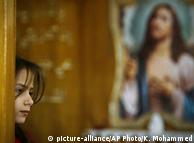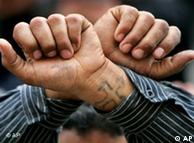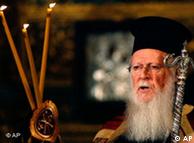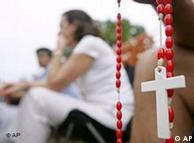Да си християнин в Турция

70-милионна Турция живеят най-много 100 000 християни
Страната на апостолите. Страната на църковните отци и на исторически събори. На фона на тази горда традиция се откроява още по-силно тъжното настояще: арменците бяха изличени от Османската империя, в хода на размяната на населението през 1923 г. в Гърция бяха депортирани 1,5 милиона гърци, мнозина бяха принудени да избягат след репресиите през 50-те и 60-те години.

Дискриминацията: вечният "спътник" на християните
Като игла в купа сено
В Турция, родина на повече от 70 милиона души, днес има не повече от 100 000 християни. Тормозът срещу тях е ежедневен, от време на време стават дори убийства, обикновено работа на националистически екстремисти. Но за пръв път се дочуват и обнадеждени гласове. "Очертава се промяна, правителството проявява смелост", казва Арам Атесян, арменският архиепископ на Истанбул.
Истанбулските арменци съставляват най-голямата християнска общност, наброяваща 70 000 души. Току-що властите им разрешиха да извършат богослужение в хилядолетната арменска черква на остров Ахтамар в езерото Ван - за пръв път от повече от 100 години.
Управляващата партия на премиера Ердоган се корени в политическия ислям, но именно тя се опитва поне да смекчи дискриминацията на християните. Същевременно е вярно, че правителството често изостава в обещанията си или пък подетите реформи просто затъват във вътрешнополитическото блато.
Православният патриарх Вартоломей от години се бори за повторното отваряне на теологическия семинар на остров Халки. Семинарът бе закрит през 1971 г. и оттогава църквата няма къде да провежда своето обучение. Този семинар е лакмусов тест за евро-зрелостта на Турция и в очите на европейските политици. Но ето, че напоследък се очертава раздвижване и по това направление: Вартоломей съобщи, че бил получил обещание от Ердоган за откриването на семинара през 2011 година.

Патриарх Вартоломей
Немюсюлманите - без шанс за издигане
Арменският патриарх Атесян казва, че едва сега с помощта на европейските съдилища и на управляващата партия християните започват малко по малко да си връщат онова, което им принадлежи. Но всичко това става бавно, много бавно.
"Дойче веле" / Портал Турция
28.02.2010
Християните - най-преследваната религиозна общност

Почти 80% от всички случаи на религиозни преследвания в света се падат на християните
Сега църквата реагира на тази ситуация като обяви тази неделя за "Ден в подкрепа на потисканите и преследвани християни".

28 февруари 2010 - ден в подкрепа на потисканите и преследвани християни
Тази година германската протестантска църква се ангажира особено за преследваните християни в Ирак. От около една година насам в рамките на специална програма Германия приема 2500 иракски бежанци. Повечето от тях са християни. Един от тях е Адел Тома. Той пристига преди няколко седмици със семейството си в бежанския лагер Фридланд край Гьотинген. Адел Тома разказва:
Бягството - единственото спасение
„Синът ни бе нападнат посред бял ден и бе тежко ранен. Искаха да го отвлекат. Аз имам работилница за ремонт на автомобили в Багдад. Като християнин бях непрекъснато преследван и обиждан. Християни, които живееха близо до нашата къща, бяха убити.”
След масивни заплахи, че къщата му ще бъде вдигната във въздуха Адел Тома продава имуществото си и със семейството си бяга в Сирия. Там и в Йордания живеят стотици хиляди бежанци. Адел Тома принадлежи към малкото, които успяват да заминат за Европа.
Миналата година Европейският съюз взе решение да приеме 10 хиляди иракски бежанци. Това стана също и поради упоритото настояване на църквите, казва Мартин Шиндехюте. Отговарящият за чужбина епископ от германската протестантска църква посочва, че допреди няколко година в Ирак са живеели 1,2 млн християни, а сега техният брой е спаднал до 600 хиляди. Бягството е единственото спасение и за християни, живеещи в други ислямски страни.
 B
B
В Ирак живеят 600 хил. християни
Християните в Турция - на изчезване
„Много християни напускат страната, също и защото са непосредствено застрашени. Повечето християни избират бягството по политически причини или поради липсата на икономически перспективи. Само една цифра: преди 100 години 25 процента от населението на Турция е било християнско. Сега християните съставляват само 0,2 процента”, казва епископ Шиндехюте.
Със своята мащабна инициатива в подкрепа на преследвани по света християни германската протестантска църква дава ясен сигнал. Но на страни като Турция, Египет и Индонезия обаче, които минават за партньори на Запада, никак не са им приятни критики по техен адрес поради преследването на християни.
Автор: М. Холенбах, Б. Емануилов/Редактор: М. Илчева
:::
Германия:шпионаж и дискриминация срещу мюсюлманите
New citizenship tests
Germany: spying and discrimination against Muslims
By Lena Sokoll
18 January 2006
Muslims living in the southwest state of Baden-Württemberg applying for a German passport now have to submit to unprecedented spying by the state that not only violates the personal rights of the individuals concerned, but also discriminates against all those of Islamic faith. Those suspected of not being “constitutionally loyal” can be interviewed and screened by government representatives—an act that openly contravenes rights of citizens under the German constitution.
Prospective citizens have to demonstrate their knowledge of the constitution and the “free democratic basic order” of Germany in order to qualify for a German passport. For the Interior Ministry of Baden-Württemberg, a person’s commitment to citizenship also includes their “internal attitude.” As of the start of this year, numerous interviews have been held with people from Islamic countries, or who are believed to hold Islamic beliefs, with the aim of uncovering the views of these passport applicants.
The basis for these interviews is a departmental handbook that encompasses 30 different points, each one containing one or more questions. The handbook is intended to resolve any doubts—or confirm them—that the immigration department has about “whether the applicant has really understood the content of his declaration [commitment to the constitution] and whether his declaration really expresses the applicant’s convictions.”
The content of the handbook represents an illegitimate intrusion by the state into the personal and political affairs of individuals. Its catalogue of questions reflects the racism of the German state, casting blanket suspicion on all Muslims for oppressing female family members, exercising self-justice and sympathising with terrorist acts. The brazen and provocative form of the questions reveals that this new procedure for assessing people for citizenship serves more to debase and intimidate migrants than to in any way defend the basic principles of the constitution.
The Interior Ministry bluntly asks Muslims whether they are supporters of Al Qaeda: “You have heard about the attacks on 11 September 2001 in New York and 11 March 2004 in Madrid. In your eyes, were the perpetrators terrorists or freedom fighters? Explain your opinion.” According to the immigration department in Baden-Württemberg, having Islamic beliefs is sufficient reason to assume that you have contact with terrorists: “You find out from people in your neighbourhood or from your circle of friends or acquaintances that a terrorist attack has been committed or is being planned. How do you react? What do you do?”
The handbook contains other questions that have nothing to do with a supposed assessment of a person’s “internal attitude to the constitution”: “In Germany you can decide whether to visit a male or female doctor. In certain cases, though, this is not possible: emergencies, shift changes at the hospital. In such cases, would you rather be treated or operated on by a female doctor (male applicants) or a male doctor (female applicants)?”
The intention behind other questions is incomprehensible: “What do you think about the following statement: ‘Democracy is the worst form of government we have, but the best one which exists.’” Other questions completely contradict the social reality of the country, a reality that migrants in particular experience on a daily basis: “Anyone in Germany can, with the relevant qualifications, obtain entry into his/her desired occupation. What do you think about this?” Other questions openly amount to political snooping and intimidation: “In Germany, parties and organisations can be prohibited due to activities that contravene the constitution. Would you continue to support such a party or organisation when it is prohibited? Under which circumstances?”
Most of the questions are related to sex and family relationships. On these issues, the immigration department takes an interest in the clothing of daughters and their participation in swimming classes, as well as the applicant’s opinion on violence in marital relationships. The latter topic offers broad opportunities for provocation: “Your daughter/sister comes home and tells you that she was sexually assaulted. What do you do as father/mother/brother/sister?” Homophobia can also be used as a reason to refuse German citizenship to Muslims: “Imagine that your adult son comes to you and explains that he is homosexual and wants to live with another man. How do you react?”
Many commentators have already pointed out that, according to these criteria, one would have to take citizenship away from many Germans—above all, from the German Pope. How many parents don’t allow their daughters to wear midriff-baring tops, how many women are dominated by men in relationships, how many people in Germany regard homosexuality as perverse? Without defending in any way any form of backwardness, these questions are sufficient to demonstrate that such criteria are completely inadequate as a basis for refusing someone the right to citizenship.
Just as repellent is the hypocrisy displayed by the immigration department, which seeks to demonstrate its tolerance in contrast to the implied backwardness of the Muslim population. After all, the German state is heavily influenced by the Christian churches, which play a far-reaching role in this country, spreading and cementing reactionary positions in relation to homosexuality and the role of women in society.
The interview ends by requesting applicants to sign a statement that threatens them with loss of citizenship should they fail to act according to the results of their attitude test. The prospective German citizen has to sign “that untruthful statements will be regarded as deception of the immigration department and—even after years—can lead to the revocation of citizenship, even if this means that as a result I become stateless.”
Such a penalty is absurd in light of the questions. What will this mean? Will new German Muslim citizens have to hand in their passports if they do not allow themselves to be treated by a doctor? This passage by the Baden-Württemberg immigration department, which poses as a defender of the German constitution, in fact contravenes the constitution (not to mention international law), which prohibits the revocation of citizenship under any circumstances if it means that the person affected were to become stateless as a result.
That the guidelines of the Interior Ministry are saturated with the racism of an authoritarian state, and in reality have nothing to do with the defence of the constitution, is also shown by what is not asked in the interview to determine the applicant’s loyalty to the constitution.
Applicants are not asked if they understand that under the constitution of the Federal Republic of Germany the dignity of a person is inviolable and that human rights are deemed sacred. The government departments do not ascertain whether the future German is familiar with Article 3 of the constitution, which states that no one may be discriminated against or favoured due to their ancestry, race, language, place of origin, or their religious or political beliefs. Nor are the officials interested in whether passport applicants are aware of the constitutional rights to freedom of opinion, association and organisation, or whether they have understood that, according to the constitution, asylum is guaranteed to victims of political victimisation and that property should serve the benefit of society as a whole.
In other words, applicants are not informed of their rights, incorporated into the German constitution after the Second World War as a direct result of the experiences of the Nazi dictatorship. Rather, Muslim applicants have to go through an interview and tolerate blanket accusations made against them, that they may not have the ability to be integrated into German society or are potential criminals, and be threatened with the harshest of penalties.
These new procedures to assess Muslims as prospective citizens in Baden-Württemberg, under the cover of “defence of democracy,” is an attempt to introduce methods of spying and intimidation that contravene every democratic principle. No one should underestimate the dangers posed because these new practices are at first aimed “only” against Muslims. Such police-state methods are often tested out against the weakest sections of society before they are applied to the entire population.
Baden-Württemberg Justice Minister Ulrich Goll (Free Democratic Party) has already used criticism of the new measures to demand an expansion of spying operations. He was quoted by the media as saying that in order to prevent allegations being made against the state for discrimination, such questions “should be applied equally to all, and not just confined to Muslims.”
http://www.wsws.org / Portal Turkey
:::
Германия - заплаха от физическо насилие към мюсюлманите,палеж на джамии,дискриминация във всекидневния живот,пряка дискриминация, както и отказ на достъп до барове, ресторанти, клубове и дискотеки. И дискриминация от страна на държавата, особено в полицията.
A survey conducted in December 2003 found that sixty-five percent of Germans claim that Islam could not fit with the West and that the majority opposes any new immigration and would feel uncomfortable living in a neighborhood with Muslims.63 This apparent discomfort is supported by the rapidly rising numbers of Turks in Germany who feel they are being discriminated against.64
The murder of Theo van Gogh in the Netherlands in November 2004 also seemed to spark violence in Germany. There were a number of assaults and several mosques were targeted by arson. Foreigners, including Muslims, face the threat of physical violence, especially, but not exclusively, in the Eastern parts of Germany. The number of Muslim victims of criminal acts has not been counted by any official statistics. However, several anti-discrimination NGOs chronicle, and assemble reports on racist attacks against foreigners in general. Furthermore, a Muslim human rights group in Duisburg (HDR) has published a report on unreported cases of racist attacks against foreigners, including Muslims.65
The EU Monitoring Centre for Racism and Xenophobia reported in 2006 that 70% of non-Muslim Germans thought that there was a conflict between being a devout Muslim and living in modern society.66 German survey respondents indicated much more negative views about Muslims than survey respondents in France, Spain, or the United Kingdom.
There is also growing criticism of the representation of Islam in schoolbooks, which often transport generalizations and discriminations and support negative prejudices. The Islamic Council held a conference about cooperating with the state in order to confront stereotypes in schoolbooks.67 New material about the Islamic world for schoolbooks is currently being developed by the German Georg-Eckert-Institute.68
Muslims often feel discriminated against in their everyday life as they face direct and indirect discrimination in the fields of employment, education, and the housing marked. Direct discrimination, like the denial of access to bars, restaurants, clubs and discotheques, is also common. And discrimination on the part of the state, especially the police and in court has also been reported.
Discrimination against foreign employees, including Muslims, in the labor market is well-documented. A survey of the EUMC found that the employment market is highly segmented between non-migrant and migrant groups.69 Differences exist between natives and immigrants in Germany in the fields of earnings, participation, and employment in general. Discrimination can be regularly observed in newspaper and internet advertisements (“German native speakers only,” “Germans Only,” “No Headscarves,” etc.). However, levels of discrimination are more significant in semi-skilled jobs than in qualified ones, although the commercial, insurance, and banking sectors discriminate tremendously against Turkish aspirants.70 Discriminations against foreigner employees, including Muslims, in the German labor marked have been repeatedly reported by the ILO.71
One of the highest, most institutionalized and widely accepted levels of public discrimination can be observed in the housing marked. Some unequal treatment of people is permitted by law, as with landlords who are allowed to refuse to take non-German tenants when they feel this is necessary to balance socio-cultural mixture in houses and neighborhoods. The German Centre for Studies on Turkey (Zentrum für Türkeistudien) has found that among reported discriminatory experiences, 15% take place in the field of the housing sector.72
Various cases of discrimination happen in state institutions. Over one third of the cases of discrimination are experienced within the field of public authorities, such as the “Ausländeramt,” the “Sozialamt,” the “Standesamt,” and the “Arbeitsamt.”73 Cases of discrimination by the police have also been reported.74 Young policemen in Berlin, however, are now trained to look at immigrants just as they look at Germans with no immigrant background.75 Human rights organizations such as Amnesty International highlight violations of human rights by German State organizations against foreigners, including Muslims, on a regular basis. The Federal Commissioner on Integration stated in 2005 that this discriminatory behavior of official institutions violated the Imperative of Equal Treatment (Gleichbehandlungsgebot) and the Constitution.76
Finally, Muslim children often face discrimination at schools. According to Kornmann, Baden-Württemberg is the federal state with by far the worst levels of discrimination against foreign children and young people.77 Foreign children in BW were found to have an almost 3.5 times higher risk of attending a special school for children with learning disabilities than German children. In addition to younger students, discrimination is also found at universities.78
In 2006 Germany adopted the General Law on Equal Treatment (Allgemeines Gleichbehandlungsgesetz), which transposes four different EU directives.79 Anti-discrimination groups had demanded the adoption of an anti-discrimination law for a long time, and the EU had been demanding one for three years. The European Court of Justice condemned Germany because of its refusal to adopt the law in February 2006. The new law has been criticized as being weak in various points, such as in still allowing property managers to refuse non-German tenants when they are concerned about an imbalanced social or cultural mixture in houses or neighborhoods.
Several German cities, including Berlin, have offered to establish anti-discrimination offices (Leitstelle gegen Diskriminierung). Apart from this, few initiatives exist which addres discrimination against Muslims, while several initiatives do exist to help foreigners,especially Turks (again, immigrants are not identified by their faith in this respect). However, “Aktion Courage,” an NGO that supports the integration of foreigners in Germany, launched a campaign in 1999 for the “integration of Muslims and Muslim organizations in Germany.” Another major initiative is “Schule ohne Rassismus” (School without racism), which is a project organized by and for pupils to confront discrimination and racism.
http://www.euro-islam.info / Portal Turkey

Няма коментари:
Публикуване на коментар